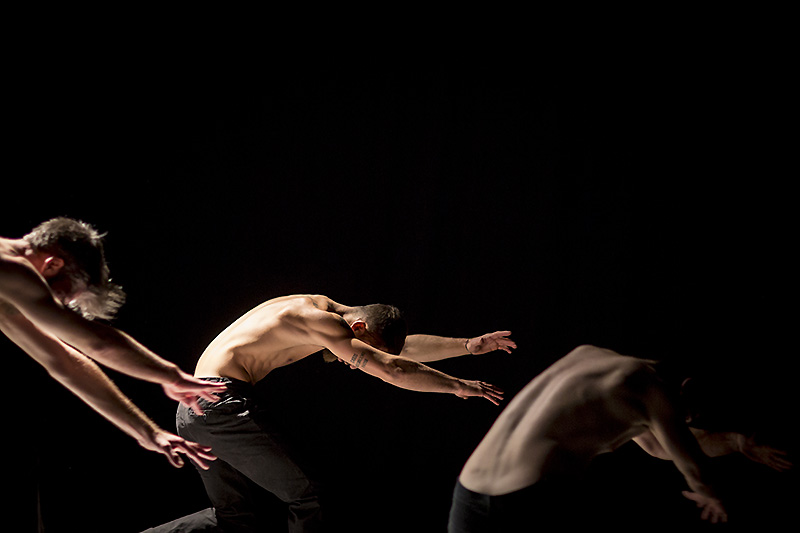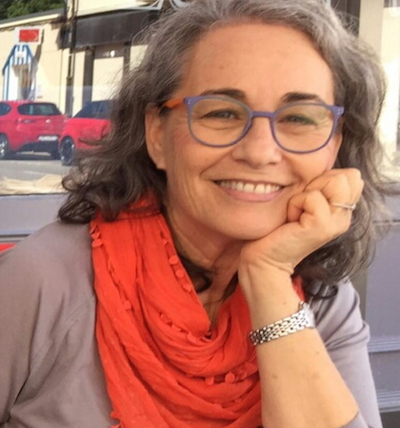Diti Ronen on A Bolero by Didier Theron

דיתי רונן על A Bolero-Didier Theron
*english follows
הַמְּשֻׁלָּשׁ שֶׁל רָאוֶל אֵינוֹ שְׁוֵה צְלָעוֹת.
הוּא נָע מִצַּד לְצַד אַחַר כָּךְ קָדִימָה
וְאָחוֹרָה, מְסַדֵּר מֵחָדָשׁ אֶת הַמֶּרְחָב.
כָּךְ אֲנַחְנוּ נִכְנָסִים לַמַּעְגָּל: חוֹצִים
אֶת הַקַּוִּים הַדִּמְיוֹנִיִּים שֶׁבֵּין הַקָּדְקוֹדִים.
חַיָּלֵי הַבְּדִיל אֵינָם מִתְעַיְּפִים. הֵם מְזִיעִים
אֶת הַחֹמֶר אֲבָל רוּחָם מוּצָקָה בִּשְׁבִירוּתָם.
הַקְּפִיצוֹת אֵינָן מַמָּשׁ קְפִיצוֹת, הֵן רַק
מְסַמְּנוֹת אֶת הַמַּעֲבָרִים בֵּין הַקּוֹמְפּוֹזִיצְיוֹת.
הַכֹּל בְּהֶתְאֵם לָאַסְטְרָטֶגְיָה. הִנֵּה הַמִּבְנֶה
יוֹצֵא לַהַתְקָפָה. מְאַרְגֵּן אֶת עַצְמוֹ בְּהֶתְאֵם
לִפְנֵי הַשֶּׁטַח. בְּהֶתְאֵם לִשְׂדֵה הַקְּרָב. הִנֵּה הַמִּבְנֶה
יוֹצֵא לַהַתְקָפָה. מִנַּיִן יָבוֹא הָאוֹיֵב? הִנֵּה
אֲנַחְנוּ מְשַׁנְּסִים מָתְנַיִם. מְגַיְּסִים כּוֹחוֹת.
הֵנָּה נַכֵּהוּ. אֲנַחְנוּ מוּכָנִים לִקְרָאתוֹ. הֵנָּה, נִתְפֹּס אוֹתוֹ
בְּטֶרֶם יַגִּיעַ, בְּעוֹדוֹ בָּאֲוִיר. כְּגוּף אֶחָד נַכֶּה בּוֹ. וְכָל אֶחָד לְנַפְשׁוֹ.
כְּגוּף אֶחָד. וְכָל אֶחָד. לְנַפְשׁוֹ. אוּלַי מִשָּׁם תָּבוֹא הָרָעָה. אוּלַי
מִשָּׁם תָּבוֹא הַטּוֹבָה. אוּלַי מִשָּׁם תָּבוֹא הַתְּפִלָּה.
It moves from side to side
The imaginary lines that are between the crowns.
The wooden soldiers never get tired. They are sweating
The meat, while their spirit is solid in their broken flesh.
The jumps are not jumps, they are just
Marking the transitions between compositions.
Everything in line with strategy. Here the formation
Goes out to attack. Where will the enemy come from? Here
We are buckling down. Summoning energy.
Here we will strike. We are ready for it. Here we will catch him
Before he arrives, whilst still in the air.
As one body. And each one. To himself.
The good will come from there. Maybe
A Bolero by Didier Theron was presented as part of the 2017 International Choreography Competition hosted by Machol Shalem Dance House.
 Dr. Diti Ronen is a poet, an editor and a translator of poetry.
Dr. Diti Ronen is a poet, an editor and a translator of poetry.
Ronen has published six full length poetry books, as well as numerous essays and articles. Her poetry has been translated into many languages and published in literary magazines and anthologies worldwide. Ronen performs her work on different stages in Israel and around the world. She was awarded three International poetry awards, including the Terra Poetica Award, two national awards , prizes of honors, poetry residencies and scholarships.
Her poetry is derived from her personal narrative, being part of a persecuted minority, as well as from imaginary alternative narratives. Accordingly, Ronen’s literary work is varied from feminist poetry, like in the book “Inner Moon: Note book” (Hakiboutz Hameuchad, 2002) that relates to the female Menstrual cycle in relation to the Moon monthly cycle, to her own family memory, like in the book “littlebird” (Bar Ilan, 2010) that relates to a specific event in The Holocaust, and to journey poetry, like in the book “The return of the house and its wanderings” (Hakiboutz Hameuchad, 2016) that relates to her search for a home (The book was awarded by the Kugel Literary Award). Her upcoming book, “Many Mothers“, relates to her collective-personal memories of her own feminine existence in previous generations.
Ronen has also edited five poetry books, all of them published in Israel (Pardess Publishing House, Haifa, 2015, 2016, 2017, 2018). She is currently in a process of editing two additional poetry books, one of them is expected to be published in 2018, and the second in 2019.
Ronen has translated and published numerous poems, all of them translated from English along and together with the poets. Currently she is working together with the poet Amir Or on a Young Georgian Poetry Anthology.
Beside her literary work, Ronen is a lecturer and a researcher of Arts, Theatre & Cultural Policy and she writes policy papers and advises on culture and arts to different organizations. She recently left her work at the Hebrew University of Jerusalem, to focus on poetry. She is the former head of Cultural Policy, Theatre and Literature Departments in the Israeli Ministry of Culture. Her academic work is in Theatre, and her research explores the Actor’s cognitive work while performing his role as a character on stage in front of an audience.
Diti was born in Tel Aviv. She is the daughter of a Holocaust survivor, and the mother of five. She lives with her spouse in Neve Monoson, a community near Tel Aviv.
